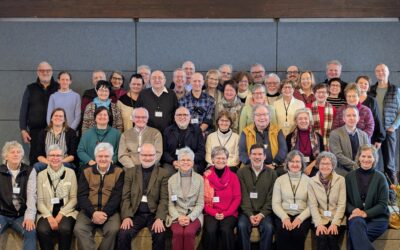
«I think that Pope Ratzinger’s decision last February 11 offered us the very essence of his theological and spiritual reflections. Above all he underscored God’s sovereignty: the consciousness that it is He who guides history. Moreover, he led us to perceive the signs of the times and to respond with the courage of choices both suffered and innovative. He left us with a clear note of hope for “the certainty that the Church is Christ’s.”
But to which countenance of the Church was the Holy Father looking? Out of love for which aspect of the Church did he take a step of such great importance? I think I am not mistaken if I say it’s “the Church as communion”, fruit of Vatican II, but also with the view of being «more and more … the expression of the Church’s essence,» as Pope Ratzinger emphasized also at the end of his pontificate.
«More and more», meaning that we have not yet fully arrived. Which direction should be taken?
We know that the Church exists for the world. For this reason, when facing the demands of reform ad intra, I think the Church should focus on looking outside itself, intensifying its dialogue with society. Such vital contact would allow the Church to make its clear voice heard as it remains faithful to the Gospel and, at the same time, listens to the aspirations of men and women of this era. Doing so, She will discover within new resources and unimagined vitality.
We will certainly need to persist in ecumenical dialogue, on this important theme of the visible unity among the Churches, striving to reach definitions of faith and ecclesial praxis acceptable to all Christians.
I would wish for a simpler Church, regarding the goods She possesses and Her liturgical expressions and manifestations. I would suggest a more fluid and direct communication with today’s society that facilitates easier relationship with people, as well as an attitude of greater welcoming also towards those who think otherwise.
Universality and openness to dialogues will therefore be two notes that must be assumed by the new Pope. So that he may respond to these enormous challenges, we envision him as a man of profound spirituality, united to God, thus receiving from the Holy Spirit solutions to the problems, in the constant exercise of collegiality, involving also lay men and women in the thought and action of the Church.
Therefore what awaits us is to work with a new sense of responsibility. This means to encourage creativity on different levels. I think of the economy which will emerge from the crisis only if placed at the service of the human person; of politics which needs to become credible again, returning to being that “shared life in the polis”; of communications as an agent of unity in society; I also think of justice, being open towards those who make mistakes, who suffer the wounds of exploitation, towards those who suffered the mistakes of other men, of other women, also in the Church. I think of those who feel excluded from the ecclesial communion, like those who “have remarried”. This too is the Church, because Christ who founded it died on the cross to heal every division.
Let’s make the true countenance of the Church shine forth. For this reason I invited all those in the world who adhere to the spirit of the Focolare Movement to make a new “pact” that everywhere our listening, trust and mutual love might grow during this time of waiting, so that the Church, in unity and in collegiality, may choose that Pope which also humanity needs.»
Source: Zenit




0 Comments